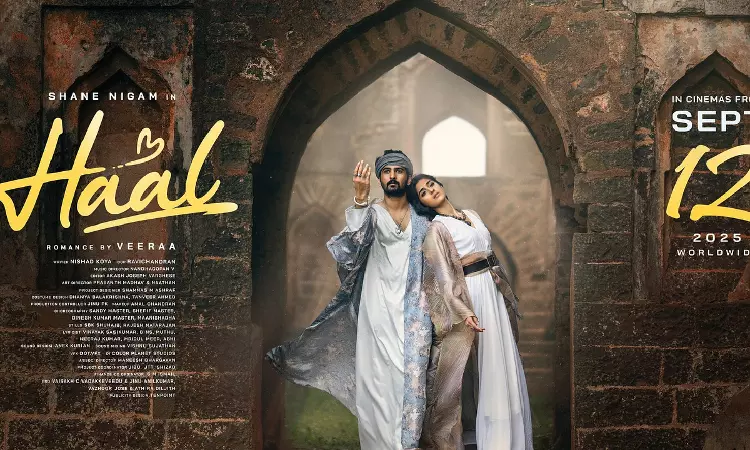- Home
- /
- High Courts
- /
- Kerala High Court
- /
- Creative Freedom Must Be Balanced,...
Creative Freedom Must Be Balanced, CBFC Failed Logic: 'Haal' Filmmakers Tell Kerala High Court Over 'A' Certification, Cuts
K. Salma Jennath
31 Oct 2025 7:13 PM IST
The Kerala High Court on Friday (October 31) partly heard arguments in the plea filed by producer and director of the Shane-Nigam starrer movie 'Haal', where they challenge the 'A' certification granted and CBFC's suggestions to cut certain scenes.One of the objections raised by the Central Board of Film Certification was that the Police are depicted in a bad light in the movie and such...
The Kerala High Court on Friday (October 31) partly heard arguments in the plea filed by producer and director of the Shane-Nigam starrer movie 'Haal', where they challenge the 'A' certification granted and CBFC's suggestions to cut certain scenes.
One of the objections raised by the Central Board of Film Certification was that the Police are depicted in a bad light in the movie and such scenes were asked to be modified.
While arguing the case before Justice V.G. Arun, the senior counsel representing the petitioners stated that there are hundreds of films in India that depict police officers as corrupt and raping women.
“Atrocities of the police are visually shown but does that mean that everybody in the country will believe that the police…the question is why pick out a scene,” argued the counsel.
He further argued that question to be considered is whether the scenes go with the whole theme of the movie.
He submitted that the two aspects, creative freedom and the deleterious effect the movie can have, are to be balanced. Reliance was placed on the Supreme Court decision in in Bobby Art International v. Om Pal Singh Hoon relating to the movie 'Bandit Queen' depicting Phoolan Devi's story to add to this argument.
He stated that the Supreme Court therein had permitted scene of Phoolan Devi being paraded naked, finding it to be central to the theme of the movie. Even if a scene is to incite disgust, it has to be permitted was what the Apex Court had held, according to the counsel.
He urged, “Suppose you make a movie on communal violence, can you have it without violence? You can but the effect of that movie, creative freedom of the individual is there… You have to balance with creative freedom and the deleterious effect the movie can have.”
Referring to the interrogation scenes in the movie, the petitioners' counsel stated that there is no violence or depiction of sensual or sexual scene that warrant an 'A' certification.
“It's a narrative, it's a story. it's a fiction, you are creating it. If that is the case, can any scene depict a police officer being corrupt, any scene in a movie where the police officer is committing rape, inciting violence? We are seeing it every day. Compared to this, absolutely nothing. Even the crucial scene…some of the objections are against that. Girl withdraws, there is no force on her. But at the time, they intervene and arrest, that is different issue. If a story like this is depicted, (i) will it fall within permissible creative freedom of expression; (ii) will it have a deleterious effect on public,” was the counsel's argument.
He went on to argue that there is no logic or application of mind in the decision of the CBFC to grant 'A' certificate. He also said that 'mature theme' is not enough to grant 'A' certification.
Referring to the objections filed by the Catholic Congress, the counsel argued that the Bishop of Thamarassery is not shown as someone promoting inter-faith marriage and such a thing is not stated. He told the Court that Bishop merely says follow one's own faith, which goes with the secular nature of the country.
After hearing the arguments for some time, the Court adjourned the matter to Monday (November 3) to continue hearing in the case.
The Court had permitted the Catholic Congress and an office bearer of the Rashtriya Swayamsevak Sangh (RSS) to be impleaded in the plea.
The Catholic Congress had stated that the film hurts the religious sentiments of Christians since the Bishop of Thamarassery is portrayed in the film as someone who is encouraging inter-faith marriages.
According to the RSS office bearer, the movie portrays the cultural organisation as a “riotous, thuggish and loutish organisation.”
Last week, on October 25 (Saturday), the petitioners had arranged for the Court and the parties along with their counsels to watch the movie.
Earlier, the petitioners had informed the Court that they preferred a statutory appeal is provided under Section 5C of the Indian Cinematograph Act, 1952. However, since the Registry had informed that there is no nomenclature or provision for appeal, the Court had asked the Registrar General to submit a report in this regard.
After referring to the report of the Registrar, the Court had told that until a specific nomenclature is notified, the matter has to be heard as a writ petition. It then expressed its willingness to hear the case.
According to the petitioners' counsel, the plot of the movie is one in which a Muslim boy and a Christian girl falls in love and though both the families are opposed to their union, the hero's father is prepared to accept the girl into the family if she converts. However, the hero firmly says 'no' to this and on hearing the hero's strong stance in this regard, the heroine is prepared to convert her religion. However, later, the heroine changes her mind during the conversion ceremony, at which time the police intervenes and uses 'Love Jihad', etc. The movie concludes with both the families realising that there is no reason to fight and both can practice their own religions.
Case No: WP(C) No. 37251/2025
Case Title: Juby Thomas and Anr. v. Union of India and Ors.



